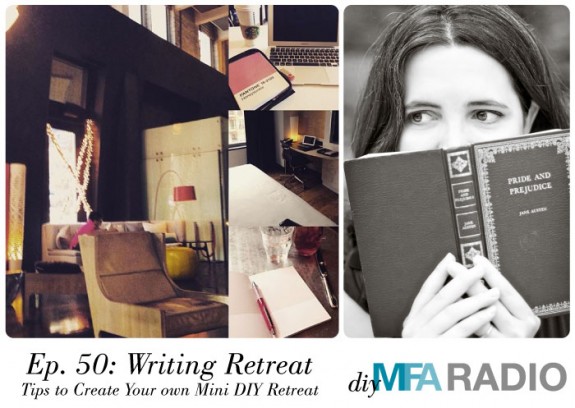Hey Word Nerds! Welcome to another episode of DIY MFA Radio.
Back in June, I went on my first mini writing retreat right here in my hometown of New York City. I didn’t go far from home–just a couple of miles–but I left the house, went to a hotel and spent about 24 hours immersed in my writing.
In those 24 hours I managed to knock out around 7000 words of the manuscript I’ve been working on. To give you some perspective, on a good week at home I’m happy if I get 4,000 words. That’s in a whole week! I discovered I could hammer out almost double the number of words in a 24-hour writing retreat than I do on a regular week at home. What a huge return on investment! This writing retreat taught me that occasionally putting my life on hold and immersing myself in my writing (even if just for a little while) can have a huge impact on my manuscript. Especially since my first deadline is only a few weeks away.
In this episode, I share some tips so you can create your own mini writing retreat.
How to Create Your Own Mini Writing Retreat
1) Book a hotel.
Until I booked the hotel and actually put the date on the calendar, my mini writing retreat was just a nice idea. Once the hotel was booked, it was a reality. Make sure you find something that is comfortable enough that you could spend lots of time writing there, but not so comfortable that you don’t get anything done.
2) Pack thoroughly.
Even though you’re only going for 1-2 days, packing can be complicated. Basically, bring everything you think you might need and more. You never know what you might wish you’d brought and you want to make sure you make it as easy as possible for you to focus on writing. Bring back ups of your writing, and multiple ways to back it up once you’re done. Bring your chargers (all of them). Print out your outline and anything else you think you might want in hard copy while you’re working. Headphones and snacks are a must.
3) It’s all about early check-in and late check-out.
To give yourself the most time possible to write, see if you can get an early check-in and late check-out at the hotel you’re staying at. Most places are happy to oblige if you give them enough advance notice. Make friends with the concierge, too. You’d be surprised what you can get with very little trouble if you only ask. Bottom line, though, give yourself as much time to write as you can! That’s what this little retreat is for, after all.
4) Make yourself a retreat schedule.
As soon as you check into the hotel, take yourself out for coffee and create a schedule of every minute you’ll be on this retreat, and then stick to it! My schedule included 1-2 hour blocks of writing. In between each writing block I would schedule either a nice walk, a meal, or bedtime. I scheduled time to write in different locations (the hotel lounge, the nearby coffee shop, the hotel room, etc.) because changing scenery helped me recharge.
Remember to make the schedule reasonable, but also challenging so you get the most out of your time. And the stick to it. When it’s time for a break, stop and take your break. When it’s time to write, turn off the internet and write. (In fact, I strongly advise not getting the hotel WiFi password.)
5) Keep a log. Then take stock
During my retreat, I also logged how long I wrote during each session and how many words I produced. Then, being the Type A person I am, I calculated my words-per-hour (WPH) pace. This gave me some interesting insights about my writing habits and patterns. For instance, I discovered that my best writing time was from 8-10:30pm. During that session I hammered out almost 2500 words, giving me a 973 WPH pace. My early morning session, on the other hand, only gave me a measly 440 WPH pace but that rate kicked back up to the 800’s by lunchtime.
If I didn’t keep a log and track my writing patterns, I’d have no idea of what was working. Now I know that even though I would love to be a morning person, I can’t string words together in any coherent way until the morning hours hit double-digits. This means I’ll be rejigging my writing habits and scheduling more afternoon and evening blocks.
Also, now that I know what I can expect of myself on a writing retreat, I can use the iteration method to improve on my results for next time. This time I wrote 7000 words, so next time I’ll raise that goal by 10% and shoot for 7700. Finally, make sure you take stock of what you’ve done when your retreat ends. It’s important to celebrate your wins (both big and small) and challenge yourself to do better next time.
Have you done a writing retreat?
If so, what was it like? How did it go for you? Do you have any tips or insights? I’d love to hear about your experiences so please share them in the comments.
Thanks for letting me share with you about my first writing retreat. If you’re interested in seeing some pictures , check out the DIY MFA Instagram account for images of my writing retreat as well as other writing related images.
Link to Episode 50
(Right-click to download.)
If you liked this episode…
Head over to iTunes, leave a review, and subscribe so you’ll be first to know when new episodes are available. Also, if you know anyone who might enjoy this podcast, please share!
Until next week, keep writing and keep being awesome.








